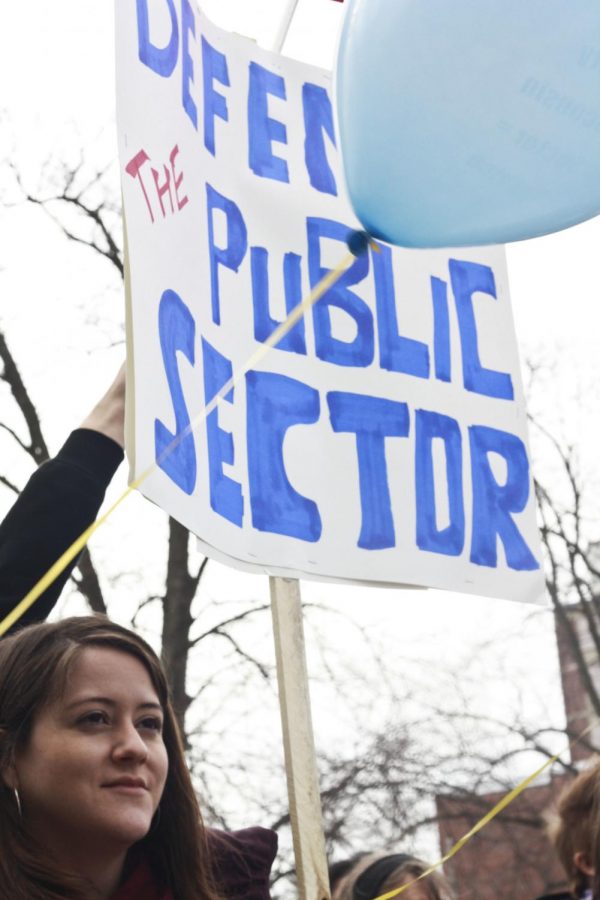This past October has seen an unprecedented surge in worker mobilization, so much so that it has been dubbed “Striketober.” At plants and warehouses across the country, working-class Americans have gone on strike to demand better pay and better treatment since the pandemic — on top of decades of exploitation and wage stagnation — has pushed many to their limits.
Most of these strikes, however, have been strikes by workers in the private sector. Meanwhile, workers in the public sector in Massachusetts and most other states have largely been left out of the past month’s wave of labor organizing.
This is because strikes by public sector unions — unions of workers working for a government employer such as a school or police department — are illegal in Massachusetts and all but 11 states. Even those states have restrictions on public sector strikes. This is a problem because strikes are an essential tool for workers to ensure that they get the pay and treatment that they deserve.
The mere threat of workers collectively walking out on the job forces bosses to listen to workers’ demands and treat them fairly. The lack of the basic right to strike means that management can more easily overwork or underpay workers. They could cut peoples benefits and increase their hours without compensation, secure in their workers’ inability to retaliate.
So why are public sector strikes illegal? The reasoning is actually quite sensible. The ban on public strikes in Massachusetts is historic: in 1919, when Boston police went on strike, then-governor and future president Calvin Coolidge fired all officers and declared public sector strikes illegal.
“There is no right to strike against the public safety, anywhere, anytime,” Coolidge said. As providers of essential services, these workers had a duty to work as needed, so allowing them to collectively walk off as they pleased would put everyone’s safety in jeopardy. The idea was convincing, and it became the standard in the rest of the country.
Another key point, though, is that not all public sector jobs are the same. Firefighters and nurses going on strike, for instance, is much different than teachers or postal workers going on strike, however harmful those latter actions may be. The former two jobs are more essential, since a strike by either group would have life-or-death consequences, as was the case with a 1980 firefighter strike in Chicago. A teacher strike, on the other hand, poses at worst temporary delays in education for students as well as problems for parents who need to drop their children off somewhere while they work.
So, does that mean that we should just replace the blanket ban on public strikes in Massachusetts with strike bans on certain workers such as firefighters? No. Regardless of whether strikes by these workers threaten public safety, it is important for it to remain an option of last resort because mistreatment of these workers — and the resulting burnout and short staffing — are just as dangerous.
Since many public sector jobs involve protecting life and maintaining public safety, they are prone to overwork and eventual burnout due to the demands of their jobs. Banning strikes allows authorities to ignore workers’ needs for higher wages and better working conditions and can threaten the very public safety that the prohibition claims that it’s trying to protect.
We have seen this issue especially with EMT workers, doctors and nurses during the pandemic, as they have been pushed to the breaking point with longer hours, fewer breaks, life-threatening exposure to COVID-19 and the same or less pay and benefits. When such important workers are allowed to be so exploited and mistreated, they will be unable to do their jobs well enough to ensure public safety. The jobs of public-school teachers, while not as directly essential to public safety, are similarly taxing and have high turnover rates.
If public sector workers’ labor is so essential, then they should get wages and working conditions that allow them to work as efficiently and effectively as possible. In this way, legalizing public sector strikes would serve to improve rather than hurt the quality of these services.
As we have seen during this pandemic, workers cannot tolerate being mistreated and devalued forever. Whether by striking illegally or simply burning out on the job, fed-up public sector workers will find a way to show they have had enough. By legalizing public sector strikes, we can ensure that workers can resolve their grievances before their mistreatment affects public safety.
While legalizing such strikes risks jeopardizing public safety, it is a risk we must be willing to take. If our public workers are being pushed to the breaking point without a way to demand better, then our public safety has been in jeopardy from the start.
Liam Rue can be reached at [email protected].



















![By freestocks.org [Creative Commons Zero], via Wikimedia Commons](https://dailycollegian.com/wp-content/uploads/2024/04/Picture1-1.png)